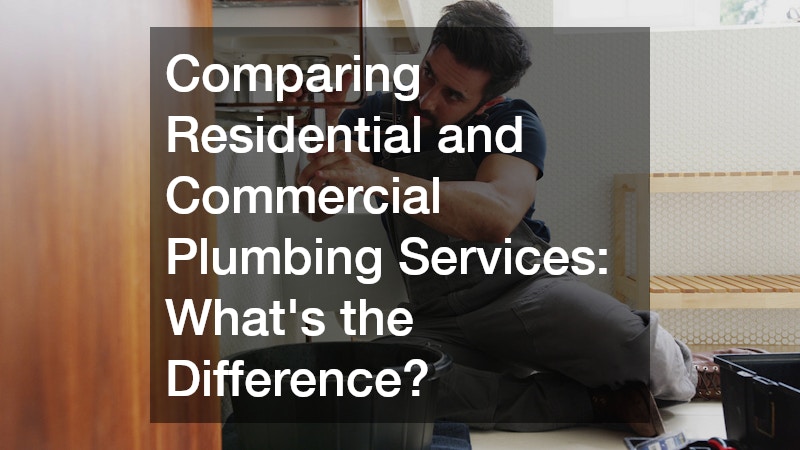When dealing with plumbing issues, it is important to know whether you need standard home support or more complex commercial plumbing services. While both types of plumbers work with pipes, fixtures and water systems, the scale, tools and expertise required can differ greatly depending on the setting.
Understanding the difference between residential and commercial plumbing helps ensure you get the right service for your needs. Whether you manage a large business site or need a quick fix in your family home, choosing the appropriate plumbing professional saves time, money and frustration.
Scale and System Complexity
One of the key differences lies in the size and complexity of the plumbing system. Residential plumbing generally involves standard fixtures and fittings like sinks, toilets and household drains. These systems are usually smaller, easier to navigate and involve fewer users.
Commercial plumbing services, however, deal with much larger systems that service office buildings, shopping centres, restaurants or factories. These systems may involve multiple floors, dozens of bathrooms, industrial-grade fixtures and extensive piping networks. A commercial plumber needs to understand high-capacity systems and often works with more sophisticated equipment.
The larger scale of commercial properties also means maintenance and repair work must be carefully planned to avoid major disruption to business operations.
Frequency of Use and Wear
Residential plumbing systems are typically used by a small number of people in a household, which means wear and tear happens slowly. Maintenance can often be handled with routine inspections and minor repairs.
In commercial settings, plumbing systems are subjected to much higher traffic. Offices, schools, public toilets and other commercial spaces may see hundreds or thousands of users daily. This leads to faster wear, more frequent blockages and increased chances of malfunction.
As a result, commercial plumbing services need to focus on durability and efficiency, often incorporating stronger materials and commercial-grade components to handle the demand.
Installation Standards and Regulations
Commercial properties are subject to stricter building codes, safety regulations and health standards than residential homes. For example, plumbing in a restaurant kitchen must comply with food safety laws, and hospitals must meet healthcare compliance standards.
Commercial plumbers must stay up to date with local council requirements and industry regulations to ensure installations meet these rules. They may also need to submit plans for approval or undergo inspections before work can proceed.
Residential plumbing also follows legal standards, but the process is generally less complex and rarely requires extensive documentation or permits unless it’s a major renovation.
Equipment and Tools Used
Residential plumbers typically use hand tools, pipe cutters, plungers and basic diagnostic devices. These tools are well-suited for smaller jobs like fixing leaky taps, unclogging household drains or replacing home toilets.
Commercial plumbing services often involve more advanced tools, including industrial water jetters, pipe relining equipment, camera inspection systems and backflow prevention devices. Large buildings may also have systems like grease traps, commercial hot water heaters and rooftop tanks, which require specialised training to manage.
Because of these differences, commercial plumbers often undergo more extensive training and carry additional certifications.
Emergency Response and Service Hours
Plumbing problems don’t always happen during business hours. For homeowners, an after-hours plumber can usually resolve an urgent issue like a burst pipe or blocked drain.
In commercial settings, the stakes are often higher. A broken pipe in a hotel, school or restaurant can halt operations, damage property and pose safety risks to staff and customers. For this reason, commercial plumbing services often provide 24/7 emergency response with a team capable of handling major issues quickly and safely.
The ability to diagnose and repair complex systems under pressure is one of the reasons why commercial plumbers are in high demand.
Cost and Project Scope
Due to the size and complexity of commercial systems, plumbing jobs in commercial environments generally cost more than residential services. The need for specialised equipment, longer work hours and compliance with commercial regulations all contribute to higher prices.
Residential plumbing tends to be more straightforward and less expensive, especially for minor repairs or maintenance. However, both types of service require transparency in quotes and quality workmanship to ensure long-lasting results.
Regardless of the project size, it’s always wise to hire licensed and insured plumbers who offer clear communication and reliable warranties.
Tailored Maintenance Plans
Another major difference is the need for scheduled maintenance. Commercial properties often require regular servicing to prevent disruptions and meet compliance standards.
Commercial plumbing services usually include long-term maintenance plans that involve inspections, cleaning and system upgrades to keep operations running smoothly. These plans reduce the risk of emergency repairs and help businesses avoid unplanned downtime.
While residential homeowners also benefit from periodic checks, the need for ongoing professional servicing is not as urgent unless the property has ageing pipes or frequent issues.
Both residential and commercial plumbing services play essential roles, but they cater to very different needs. If you’re managing a business or commercial building, it’s important to choose a plumber with the experience, tools and knowledge to handle complex systems and regulations.
Homeowners, on the other hand, benefit from plumbers who understand the needs of domestic systems and can offer quick, cost-effective solutions.
In either case, hiring the right professional ensures your plumbing runs safely and efficiently. For commercial settings, that often means partnering with a licensed team that can deliver prompt service, quality repairs and compliance with all relevant standards.

